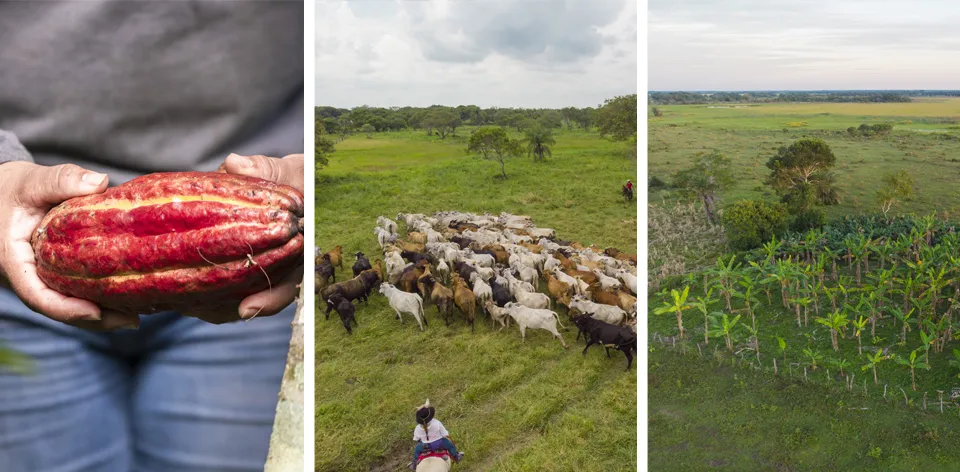 23/9/2024
23/9/2024
Sustainable land management: the pillar of agricultural rural planning - biocarbon Orinoquia project

The closing mission of the second phase of the Biocarbon Orinoquia Project took place in Colombia, presenting results on the progress of integrated land-use planning and governance to control deforestation and promote sustainable land use and management.
UPRA implemented key tools for land governance and regularization, while the project's outcomes will be integrated into other national initiatives to ensure their long-term sustainability.
Bogotá D. C., septiembre de 2024 (@Minagricultura, @UPRAColombia, @dorairey). As part of the Biocarbon Orinoquia Project, the Agricultural Rural Planning Unit (UPRA) plays a key role in technical management and the development of information for territorial planning and land management processes in the region. This project, led by the Ministry of Agriculture and Rural Development with the support of the World Bank, has aimed to reduce CO2 and greenhouse gas (GHG) emissions in the region, known as the agricultural hub of Colombia.
For the past six years, the Biocarbon Orinoquia Project has worked to promote climate-smart and low-emission agriculture. Within this framework, UPRA has implemented several initiatives to foster the sustainable use of natural resources and low-carbon agriculture. “UPRA was an essential part of the Biocarbon Orinoquia project, generating key products for rural planning. Among them, the identification of agricultural landscapes, a land-use planning tool useful for protecting small-scale farming and promoting rural development. In addition, through crop monitoring and land tenure, we provided tools that are now being expanded to the rest of the country," explained Dora Inés Rey, the organization's director.
Some of the key products delivered by UPRA include:
Sustainable development-oriented agricultural landscapes:
-
Cattle-Raising Landscape in Paz de Ariporo, Casanare: A land-use planning model that fosters the conservation and preservation of the country’s unique floodplain ecosystems.
-
Cacao Landscape in Acacías, Meta: Focused on family farming, this landscape promotes sustainable, low-carbon practices for cacao cultivation in the Acacías foothills.
Rural Property Distribution Diagnosis in Orinoquia:
-
This study, conducted in Arauca, Casanare, Meta y Vichada, provides a solid foundation for the regularization of rural property, facilitates land access, and promotes more inclusive agriculture.
Land Price Analysis in Arauca, Casanare y Vichada:
-
UPRA conducted an in-depth analysis of rural land prices at a 1:100,000 scale, offering a clear view of the land market in Orinoquia's departments.
Crop Monitoring and Management:
-
Satellite Crop Monitoring: Through spatial data infrastructure, UPRA implemented a monitoring system for six key production chains: rice, livestock pastures, forestry, palm oil, cacao, and cashew. This system allows for deeper analysis of production using artificial intelligence and satellite imagery.
-
Territorial Strategy for Rural Land Regularization in Orinoquia:
A Territorial Strategy for Rural Land Regularization, was developed to promote legal security in land tenure and strengthen equitable land access in the region’s four departments.
Land Market Characterization:
-
UPRA conducted a detailed analysis of land markets in (Meta, Vichada, Casanare y Arauca), helping to better understand the economic dynamics in these areas and their impact on land-use planning.
The project leaders praised UPRA’s work: "As we close the second phase of the Biocarbon project, it’s important to highlight the collaboration with national organizations like UPRA, Ideam, Agrosavia, and producer organizations in rice, cacao, palm oil, livestock, forestry, and cashew sectors. Without their unconditional support and commitment, many of the project’s objectives would not have been met," said Daniel Aguilar, leader of the Land Use and Sustainable Management component of the Biocarbon Project.
The project also laid the foundation for continuing these developments, integrating them into other UPRA initiatives to ensure long-term sustainability. “The projects developed with Biocarbon's support are now part of UPRA's institutional mission. We are promoting the creation of agricultural landscapes across the country, expanding crop monitoring beyond Orinoquia to the entire nation, and aligning these efforts with the Ministry of Agriculture’s priorities, particularly for small-scale, family, and community agriculture. We are also working on information management and access mechanisms for all the products generated by the Biocarbon project,” added the UPRA director.
Javier Neva Díaz, a UPRA expert, concluded: “With the completion of the second phase of the Biocarbon Orinoquia Project, an integrated effort has been consolidated, leaving a lasting legacy in the region. The results not only benefit the environment but also local communities by promoting inclusive, low-emission agriculture.” This project is set to become a replicable model for other regions of the country, reaffirming UPRA and its partners’ commitment to a more sustainable and climate-resilient Colombia.
“We are very satisfied with the results. We managed to design low-carbon production systems for key production chains such as cacao, rice, palm oil, and cashew. Additionally, we have laid a solid foundation for scaling these systems across the territory. Colombia has become a global reference in sustainable forest landscapes, and the next step is to implement these solutions on a larger scale,” emphasized Nelson Lozano Castro, coordinator of Environmental Sustainability and Climate Change at the Ministry of Agriculture and Rural Development.
The closing of this initiative marks a milestone in the country’s rural planning, demonstrating that collaboration between institutions, the private sector, and communities is crucial to facing future environmental challenges. The results achieved with UPRA and other entities reflect successful inter-institutional cooperation.

